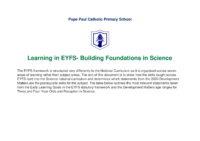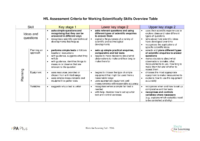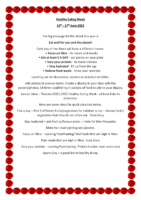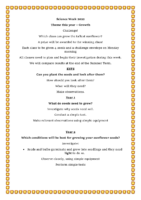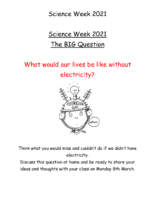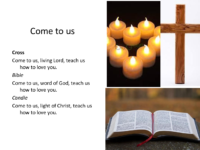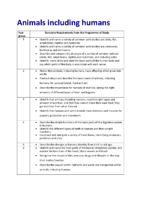Science
Intent
At Pope Paul School our Science Curriculum is designed to develop confident, discerning learners who are highly motivated to achieve their full potential by developing scientific knowledge and conceptual understanding through the specific disciplines of biology, chemistry and physics. In our school we follow the Gospel values so we strive to respect and care for God’s creation. In our curriculum we plan to give children time to investigate through observing, questioning and evaluating.
| KS1 Scientific Skills | Year 3 and 4 Scientific skills | Year 5 and 6 Scientific skills |
| Looking for patterns- sorting and grouping | Looking for patterns- identifying and classifying | Using scientific language to draw conclusions |
| Recording information | Choosing how to record information- tables, tally charts, Venn and Carroll diagrams and bar charts | Using and developing keys to identify and classify living things and materials |
| Using books, videos, the internet, people and photos to find answers | Recognising when to use other sources of information to find answers | Recording data, taking repeat measurements where necessary and calculating a mean |
| Observing and measuring | Carefully observing and accurately measuring | Recognising when to use other sources to answer questions and separating opinion from fact |
| Saying why a test is fair | Setting up fair tests (with help) | Accurately taking measurements using scientific equipment |
| Performing simple tests and using equipment | Setting up enquiries and choosing equipment | Planning different types of enquiry controlling variables where necessary |
| Asking questions | Asking relevant questions | Using scientific knowledge to ask questions |
| Explaining results- saying what we found out | Explaining results- drawing conclusions and using results | Evaluating plans and results and suggesting improvements |
Our Science curriculum shows a progression of knowledge and skills. To inform planning each topic begins with a KWL grid- (What we know, what we would like to know and then what we have learnt.) Many topics are revisited in different year groups to support children in retaining information and extending their knowledge.
| Year | Electricity | Plants | Animals Including Humans | Living Things and Their Habitats | Materials | Light and Sound | Forces |
| EYFS | EYFS | EYFS | EYFS | EYFS | EYFS | ||
| 1 | In the Garden | Different Animals | Seasonal Changes | Everyday Materials | |||
| 2 | Growing Plants | Growth and Survival | Habitats | Use of Everyday Materials | |||
| 3 | Investigating Plants | Healthy Eating and Healthy Bodies | Year 3
Classification and Interdependence |
Rocks, Fossils and Soils | Light and Shadows | Forces and Magnets | |
| 4 | Circuits and Components | Teeth and Digestion | Solids, Liquids and Gases | Sounds and Vibrations | |||
| 5 | Human Life Cycle | Life Cycles | Changes of Materials | Earth and Space
Forces |
|||
| 6 | Electricity | Human and health | Classification
Evolution and Inheritance |
Light |
Science Curriculum
| Year | Autumn Term 1 | Autumn term 2 | Spring Term 1 | Spring Term 2 | Summer Term 1 | Summer Term 2 |
| 1 | Animals Including Humans | Seasonal Change | Everyday materials | Seasonal change | Plants | Plants |
| 2 | Animals Including Humans | Living Things and Their Habitats | Use of Everyday Materials | Use of Everyday Materials | Plants
|
Living Things and their Habitats |
| 3 | Animals Including Humans | Force and Magnets | Rocks | Forces | Light | Plants |
| 4 | Animals Including Humans | Sound | States of Matter | Sound | Electricity | Living Things and their Habitats |
| 5 | Animals Including Humans | Living Things and Their Habitats | Properties and Changes of Materials | Forces | Space | Space |
| 6 | Animals Including Humans | Light | Evolution | Evolution | Electricity | Living Things and their Habitats |
Science is taught through developing subject knowledge and scientific skills. Scientific vocabulary is displayed in classrooms. There are strong links with reading throughout Science plan lessons to promote the love of Science and provide them with experiences to support them with retaining information. The allocation for Science is 1.5 hours a week in KS1 and 2 hours a week in KS2.
Pupils are encouraged to develop a curiosity and love for God’s natural world and appreciation of our beautiful school grounds. Classes have gardens to grow plants and food, focusing on a topic linked to other curriculum areas. Teachers plan outdoor activities of growing plants and food linked to Laudato Si. Through this children develop knowledge of growing and caring for God’s creation and giving back to our common home.
Our Science Curriculum supports SEND through Quality First Teaching, scaffolding and supporting children. Our ambitious curriculum ensures all children’s needs are met.
The majority of the children leave school at ARE or above by the end of Year 6. They have a strong knowledge of the key areas in Science and are equipped with a secure knowledge of scientific skills. We have strong links with DAO Dame Alice Owen’s School, our local secondary school. To ensure a smooth transition to secondary school, Science teachers and Science Ambassadors work with Year 5 and 6 children in the Summer Term. With these strong links and working with outside agencies, we demonstrate how science can be potential careers in the future.
National Science week provides opportunities for children to learn additional topics linked to Science and time to develop their scientific skills to observe, question and investigate. Science weeks are fun and interactive to engage children and to develop an understanding of real life. Teachers provide children with knowledge of the difference Science can make to our world. Making Science memorable is at the heart of our planning to help children to retain information that they have learnt.
Healthy Living Week, a link with PSHE and PE is celebrated through Year 6 leading different activities to encourage Healthy living. Teachers plan and teach activities and to ensure science objectives are met.
Every year we celebrate National Tree Week. We plan activities outdoors so children have the opportunity to look at trees closely and learn about what we have in God’s world.
In our Science Curriculum we make cross curriculum links
| Subject | Links |
| Maths | Graphs and analysing data. |
| English | Writing up results/findings |
| Art | Observing and drawing nature or findings. |
| PE | Healthy living. |
| Computing | Research |
| Religion | Awe and wonder.
Laudato Si Bio-diversity Growing, plants and food. |
Implementation
Resources are used effectively to support the teaching and learning of Science at Pope Paul School. Recent Science INSETs have included outdoor learning, child-led enquiry and support from the HfL Advisor supporting PSQM. The Subject leader attends cluster meetings to learn about changes and updates in the Science Curriculum. We have good links with the Dame Alice Owen Science Department. Pope Paul achieved the PSQM Silver Award 2017 with their good teaching and links with other schools/people in our community. Science is monitored regularly. Our PSQM renewal process begun in Autumn 2020 and in September 2021 we were delighted to be awarded the PSQM Gilt Award.
The Primary Science Quality Mark is led by the University of Hertfordshire, School of Education in collaboration with the Primary Science Teaching Trust. Associate Professor Jane Turner, PSQM National Director said: “There was never a more important time for primary children to have a high-quality science education. The Coronavirus Pandemic has made everyone aware of the impact of science on our daily lives. Primary schools have an important role to ensure that children understand how science works and keeps us healthy and safe. Schools that have achieved a Primary Science Quality Mark have demonstrated a significant commitment to science teaching and learning, even at this challenging time for schools. The profile and quality of science in each awarded school is very high. Children are engaging with great science both in and outside the classroom, developing positive attitudes towards science as well as secure scientific understanding and skills. Science subject leaders, their colleagues, head teachers, children, parents and governors should be very proud.”
Scientific skills are identified in science books and pupils refer to the skills they cover in each lesson. At the end of each topic teachers assess children using the HfL criteria.
Rich learning opportunities such as school trips enhance learning and build cultural capital. In 2019, Years 1, 2 and 5 went to London Zoo and attended workshops linked to their Science topics. This trip also supported our whole school writing project on Joan Proctor, The Reptile Doctor.
Impact
Pupils leave Pope Paul with a strong foundation of scientific knowledge and skills ready for their next stage of learning. The children are confident with the five different types of enquiry; observing, identifying and classifying, pattern seeking, research and fair testing to enable them to thrive in their science education. Children know how they can care for their world and how their actions can make an impact on the future.


